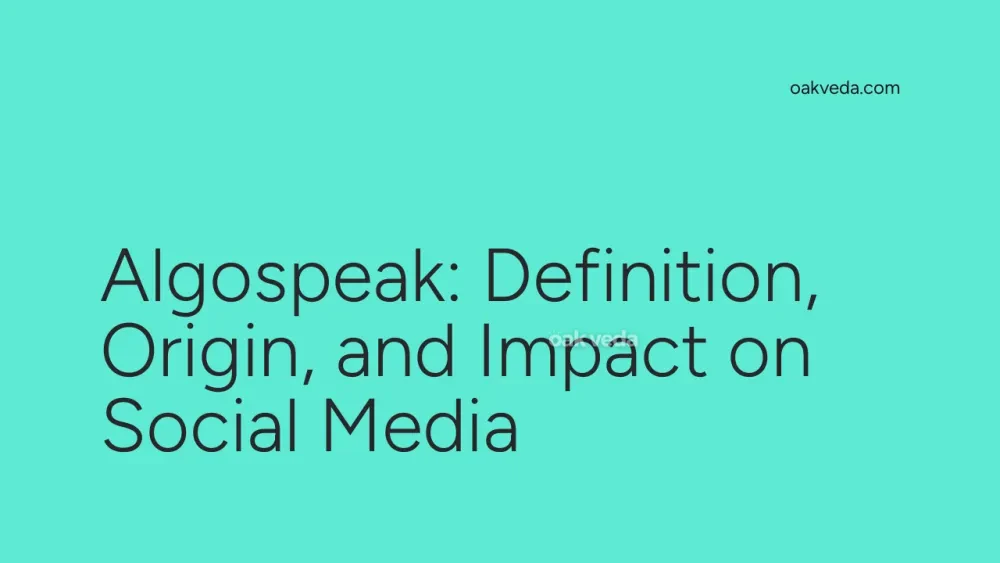
What is Algospeak?
Algospeak is a creative language tactic used on social media platforms to circumvent content moderation algorithms. Users employ this method by intentionally misspelling words, using code words, or substituting emojis for potentially flagged terms. The primary goal of algospeak is to avoid having content removed or accounts suspended while still conveying the intended message.
Origin and Development of Algospeak
The term "algospeak" is a portmanteau of "algorithm" and "speak," reflecting its purpose of outsmarting social media algorithms. While the exact origin of the term is unclear, the practice has evolved alongside the increasing sophistication of content moderation systems on platforms like TikTok, Instagram, and Facebook.
As social media platforms have become more stringent in enforcing community guidelines, users have adapted by developing creative ways to express themselves without triggering automatic content flags. This has led to the emergence and rapid evolution of algospeak as a form of digital linguistic innovation.
How Algospeak Works
Algospeak functions by exploiting the limitations of content moderation algorithms. These systems are designed to detect specific words, phrases, or patterns that may violate community guidelines. By altering the spelling or representation of potentially problematic terms, users can effectively "speak in code" that is understandable to human readers but often bypasses automated detection systems.
Common algospeak techniques include:
- Intentional misspellings (e.g., "seggs" instead of "sex")
- Using homophones or similar-sounding words (e.g., "unalive" instead of "kill")
- Employing emojis as substitutes for words (e.g., ð½ for "porn")
- Creating new slang or code words (e.g., "panoramic" for "pandemic")
Popular Examples of Algospeak
Algospeak has given rise to a new lexicon of terms and phrases across various social media platforms. Some popular examples include:
- "SA" or "seggs" for "sex"
- "Unalive" for "dead" or "kill"
- "Corn" or ð½ for "porn"
- "Panini," "panorama," or "panoramic" for "pandemic"
- "Accountant" for sex worker or OnlyFans content creator
- "Le dollar bean" for "lesbian"
These examples demonstrate how users creatively adapt language to navigate content moderation while maintaining communication with their audience.
Impact of Algospeak on Social Media Culture
Algospeak has significantly influenced social media culture in several ways:
-
Linguistic Innovation: It has spurred the creation of new words and phrases, contributing to the ever-evolving nature of internet language.
-
Community Building: Users who understand and employ algospeak often feel a sense of belonging to an "in-group" that can decode these messages.
-
Challenges for Content Moderation: The proliferation of algospeak has made it more difficult for platforms to effectively moderate content, leading to ongoing adjustments in their algorithms.
-
Increased Awareness of Digital Censorship: Algospeak has heightened user awareness of content moderation practices and sparked discussions about free speech online.
-
Adaptation of Marketing Strategies: Brands and influencers have had to adapt their communication strategies to navigate content moderation while still reaching their target audience.
Controversies and Debates Surrounding Algospeak
The rise of algospeak has sparked several controversies and debates:
-
Effectiveness vs. Ethics: While algospeak allows users to express themselves more freely, some argue that it undermines the purpose of content moderation designed to create safer online spaces.
-
Freedom of Expression: Proponents view algospeak as a form of digital resistance against overly restrictive content policies, while critics see it as a way to circumvent necessary safeguards.
-
Impact on Language: Linguists debate whether algospeak represents a natural evolution of language or if it potentially hinders clear communication.
-
Accessibility Issues: The use of algospeak can make content less accessible to those unfamiliar with these codes or relying on translation tools.
How Brands and Influencers Use Algospeak
Savvy brands and influencers have begun incorporating algospeak into their social media strategies:
-
Avoiding Shadowbans: By using algospeak, they can discuss sensitive topics without risking account restrictions or reduced visibility.
-
Engagement Boost: Employing popular algospeak terms can increase engagement with younger audiences who are familiar with this language.
-
Brand Voice Adaptation: Some brands use algospeak to appear more relatable and in tune with current social media trends.
-
Content Strategy: Influencers may create content explaining algospeak terms, positioning themselves as cultural translators for their audience.
Future Trends Related to Algospeak
As social media continues to evolve, so too will algospeak:
-
AI Advancements: As content moderation algorithms become more sophisticated, algospeak is likely to become more complex and nuanced.
-
Platform-Specific Variations: Different social media platforms may develop unique algospeak dialects based on their specific content policies.
-
Mainstream Adoption: Some algospeak terms may eventually enter mainstream language, similar to how other internet slang has been adopted.
-
Policy Changes: Social media platforms may adjust their content moderation policies in response to the prevalence of algospeak.
-
Educational Initiatives: There may be a rise in resources aimed at helping users navigate the changing landscape of online communication.
FAQs about Algospeak
-
Is algospeak only used on TikTok? No, algospeak is used across various social media platforms, although it may take different forms depending on each platform's specific content moderation policies.
-
Does using algospeak guarantee my content won't be flagged? While algospeak can help avoid some automated content flags, it doesn't guarantee that content won't be removed if it violates platform guidelines.
-
Is algospeak considered a form of censorship? Opinions vary, with some viewing it as a creative response to overly restrictive policies, while others see it as a way to potentially circumvent necessary content moderation.
-
How can I keep up with new algospeak terms? Following social media trend reports, engaging with online communities, and paying attention to how language evolves on your preferred platforms can help you stay updated on algospeak.
In conclusion, algospeak represents a fascinating intersection of linguistic innovation, digital culture, and the ongoing negotiation between free expression and content moderation on social media platforms. As online communication continues to evolve, algospeak will likely remain a significant aspect of how users navigate and shape their digital environments.
You may be interested in:

